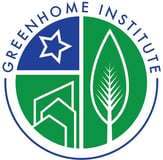What's up with the Taylorville High, Net Zero, Pretty Good House Student Build?
GreenHome Institute Weekly Free CE Webinar Presents:
What's up with the Taylorville High, Net Zero, Pretty Good House Student Build? - Free CE Webinar
Wednesday, June 26 @ 12 PM EDT
Details to view the event are private and will be sent along with your ticket purchase.

